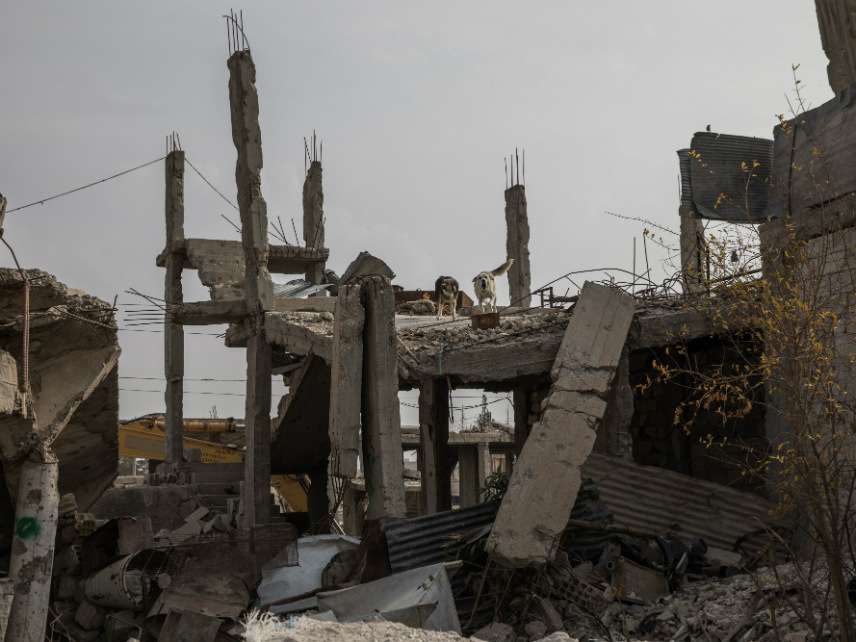The Answer Trump Needs in Syria
Withdrawal and diplomacy is the most prudent path forward in Syria. Not military escalation.

President Trump says there will be a "big price to pay" for the horrific chemical weapons attack reported in the rebel-held area of Eastern Ghouta, Syria. "If it's Russia, if it's Syria, if it's Iran, if it's all of them together, we'll figure it out and we'll know the answers quite soon," he pledged Monday. "So we're looking at that very strongly and very seriously."
What those answers may be—along with their second- and third-order effects—is anyone's guess. On the one hand, there is the president's well-established aversion to regime change. As a private citizen in 2013, Trump was stridently opposed to military intervention against the Bashar al-Assad regime, counseling on Twitter that there is "no upside and tremendous downside" to ousting Assad.
As president-elect, Trump held that line, telling supporters his administration would "stop racing to topple foreign regimes that we know nothing about, that we shouldn't be involved with." And as recently as March 29, Trump mulled ending U.S. military action in Syria now that the Islamic State's presence and power there is decimated. "We'll be coming out of Syria, like, very soon," he said. "Let the other people take care of it now."
Trump has never been skeptical of war, but he seeks to avoid regime change projects because his nationalist agenda has no place for the cost and responsibility of foreign nation-building (and, in recent years, cycles of insurgency, military surge, and reconstruction) they inevitably incur. In Syria, this instinct points him away from a military-centric answer to Assad.
But not all Trump's advisors are of the same mind, and the president's few comments about his Syria decision so far—he says the U.S. has "a lot of options militarily," per a Reuters report—suggest these more hawkish voices are winning the day. New National Security Advisor John Bolton particularly will push Trump toward large-scale military action, likely beginning with the sort of missile strike Trump ordered in April 2017 against Assad and escalating from there. Bolton's ideal is for Washington to forcibly remap the greater Mideast, and he will eagerly use Assad's evil and cruelty to push Trump toward that end.
A strike on Syrian regime targets may be inevitable—the big question is what happens next. Will Trump adopt in Syria the hubris of regime change he has rightly decried in Libya and Iraq? Or will he recognize that war on Assad offers no sure route to stability, that it cannot guarantee fewer civilian casualties, that it does not secure an end to the chaos and misery Syria has so long endured?
Reflecting on that 2017 attack, writer Michael Brendan Dougherty raised a point at The Week that is equally pertinent now: Great power intervention in Syria's civil war has almost certainly prolonged the conflict. "When a band of rebels who by themselves have little hope of overthrowing their government can suddenly imagine a major power like the United States intervening on their behalf, the cost of revolution is lowered," he wrote, "The same goes for dictators holding onto a decrepit regime. If Iran and Russia swoop in, the dictator can defer recognizing the reality of his broken rule, and instead of accepting exile, he fights on."
And there is real risk to the great powers, too, as Trump's inclusion of Russia in his remark about forthcoming answers makes starkly clear. Russia's support for the Assad regime means a U.S. military response to Assad risks war with Russia, a nuclear power, as well as its ally, Iran. This is a dangerous game of dominoes, and one in which America has no vital interest to defend but quite a lot to lose.
The most prudent path is the one already announced by the president: to withdraw U.S. forces from Syria's civil war and use the United States' unparalleled diplomatic power to pursue a viable detente in Syria. Sometimes there are no good military options, and we must opt for the least bad policy on the table.
Washington has the power to bring the relevant parties to the negotiating table and demand an arrangement that makes future chemical attacks impossible and begins to address the disastrous conditions causing the Syrian refugee crisis. That would be an answer worth giving.

Show Comments (69)